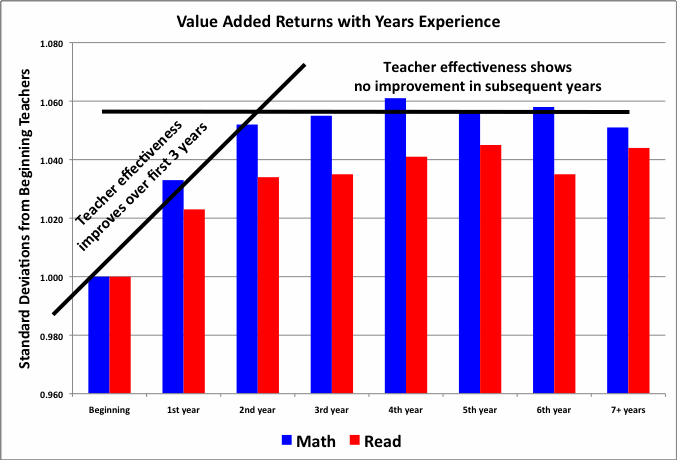Citation: https://www.nber.org/system/files/working_papers/w12155/w12155.pdf
What effect does experience have on teacher effectiveness?
Why is this question important? It has long been assumed that teachers become more effective with experience. In particular, that beginning teachers are least effective. In order to develop and maintain effective teachers, it is critical to understand what effect experience has on performance, and how to improve performance over time.
See further discussion below.

Source: What Does Certification Tell Us About Teacher Effectiveness? Evidence From New York City
Results: The data suggest that beginning teachers are less effective than experienced teachers, and that there is improvement over the first three years. However, the data also suggests that additional years experience do not result in continuing improvement in effectiveness. The scale on data display was calibrated to show these differences. Overall, they are extremely small and there is little difference between teacher performance at all years.
Implications: In an ideal system, teacher effectiveness would continue to increase with years of experience. Educational systems invest a lot of effort towards this goal, including professional development, incentives for additional degrees, etc. This data suggests that these efforts have been ineffective in making a difference. The effectiveness of a teacher (good or bad) is unlikely to change after the third year of teaching.
Authors: Thomas J. Kane, Jonah E. Rockoff, Douglas O. Staiger, National Bureau of Economic Research
Publisher: National Bureau of Economic Research
Study Description: The study examined teacher effectiveness for teachers hired between 1999-2000 and 2004-2005 in New York City. The study measured the relative experience of teachers using panel data on students reading and math test scores that also identifies students' reading and math teachers. Specifically, it used students' test scores in grades four through eight to estimate the value-added of their teachers, controlling for students' prior-year test scores and a number of student, classroom, grade, and school related factors, and controlling for teachers' experience levels. Of the 51,977 teachers hired, it was able to successfully match 10,040 teachers with student performance.
